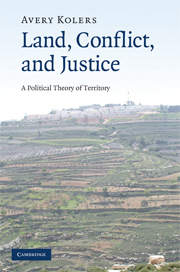Book contents
- Frontmatter
- Contents
- List of tables
- List of figures
- Foreword and acknowledgments
- Introduction
- 1 Everything you always wanted to know about taking other people's land (but were afraid to ask)
- 2 Land and territory in political theory
- 3 Groundwork
- 4 Plenitude
- 5 Territorial disputes
- 6 Implementation
- Works cited
- Index
3 - Groundwork
Published online by Cambridge University Press: 07 August 2009
- Frontmatter
- Contents
- List of tables
- List of figures
- Foreword and acknowledgments
- Introduction
- 1 Everything you always wanted to know about taking other people's land (but were afraid to ask)
- 2 Land and territory in political theory
- 3 Groundwork
- 4 Plenitude
- 5 Territorial disputes
- 6 Implementation
- Works cited
- Index
Summary
A theory of territorial rights must in the first instance provide an account of the subject and the object of territorial rights. That is: who can have territorial rights, and precisely what does one have when one has them. In terms of the framework developed in Chapter One, the former question is a restatement of the eligibility problem. While there is a sense in which the who question is prior to the what question, knowing more about the nature of territory will help clarify eligibility.
We already know something about how to answer these two questions. From the two previous chapters we know that territory is neither identical to nor derivative upon property. The two clearly intersect, but neither concept exhausts the other, and neither provides a sufficient basis for causal or justificatory accounts of the other. Certain rights that property owners have, such as eviction of tenants or wanton destruction, go beyond the rights that territorial rights-holders have. But this does not support grounding territory in property, because territoriality involves structuring internal property relations and creating classes of things that can be owned. But fundamentally, to treat territory as identical to or constructed out of property is to take a side in favor of the Anglo-American ethnogeography (or in Levy's terms: to reflect the liberal conception of land), and to impose that on all.
But these claims are mostly negative; they tell us what territorial rights are not, but not what they are.
- Type
- Chapter
- Information
- Land, Conflict, and JusticeA Political Theory of Territory, pp. 66 - 99Publisher: Cambridge University PressPrint publication year: 2009



